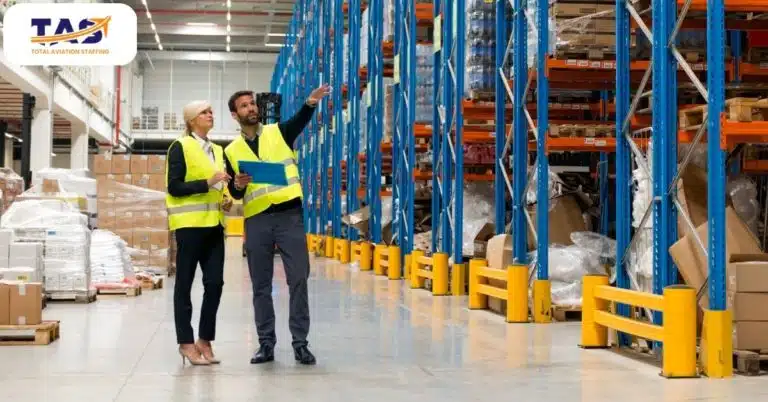Material Handler Job Outlook

Are you considering a career as a Material Handler in the aviation industry? With the steady growth in air travel, the demand for aviation maintenance and repair services has increased. This has resulted in an increased demand for Material Handlers who play a crucial role in managing and distributing aircraft parts and components.
Let us explore the Material Handler job outlook, industry trends, required skills and qualifications, opportunities for career advancement, and tips on how to stand out in the competitive job market.
The Growing Demand for Material Handlers: Exploring Industry Trends and Statistics
Material handlers play a critical role in the aviation industry by ensuring the efficient movement of aircraft parts and components. With the aviation industry’s growth and the increasing demand for air travel, the need for skilled material handlers has also risen.
According to industry statistics, the employment of material handlers is expected to grow by 4% from 2020-2030. Additionally, the Bureau of Labor Statistics predicts that the demand for material-handling workers in the transportation and warehousing industries will increase by 2.2% annually.
As air travel continues to expand, there will be a continued demand for material handlers in aviation, making it an attractive career path for those interested in the industry. If you have a passion for aviation and enjoy working with your hands, becoming a material handler could be a great opportunity to start or grow your career in the field.

The Role of Technology in Material Handling: How Automation is Changing the Job Landscape
The aviation industry is embracing technology to streamline material handling processes, leading to significant changes in the job landscape for material handlers. Automation is revolutionizing the way materials are received, stored, and distributed, increasing efficiency and accuracy.
Here are some key points on how technology is changing the role of material handlers:
Adoption of automated systems, such as robotic palletizers and conveyor belts, for faster and more precise movement of materials.
Use of advanced inventory management software to track stock levels, orders, and shipments.
Integration of RFID (Radio Frequency Identification) technology for real-time monitoring and tracking of materials.
Implementation of automated picking and packing systems to optimize order fulfillment processes.
Training and upskilling of material handlers in operating and maintaining automated equipment.
As technology continues to advance, material handlers in aviation need to adapt to the changing landscape and acquire new skills to remain relevant in the industry. While automation may reduce the demand for manual material handling tasks, it also presents opportunities for material handlers to specialize in operating and maintaining automated systems. As the aviation industry continues to evolve, staying updated with technological advancements will be crucial for material handlers to thrive in their roles.

Skills and Qualifications Required for Material Handler Jobs: What Employers are Looking For
Employers in the aviation industry seek material handlers who possess the right skills and qualifications to ensure smooth operations in their warehouses.
Here are some key points on the skills and qualifications required for material handler jobs in aviation:
High school diploma or GED preferred.
Ability to read, write, and enter information accurately.
Strong communication, teamwork, and coordination skills.
Proficient in basic computer skills for inventory management.
Physical capabilities to operate equipment, lift heavy objects, and perform manual tasks.
Knowledge of warehouse safety protocols and adherence to organization standards.
Attention to detail in recording, counting, and inspecting materials.
Ability to follow processes, procedures, and rules in a fast-paced environment.
Dependability and time management for efficient material handling operations.
Employers value material handlers who are skilled, organized, and reliable in handling aviation materials. Staying updated with industry regulations and advancements is crucial for material handlers to excel in their roles and contribute to the smooth functioning of the aviation supply chain.

Opportunities for Career Advancement: Advantages and Challenges of Moving Up the Material Handling Career Ladder
As material handling is a critical function in aviation, there are opportunities for career advancement. Here are some of the advantages and challenges of moving up the material handling career ladder:
Advantages of Career Advancement:
Higher job responsibilities and leadership roles.
Increased pay and benefits.
Expanded knowledge and skills through training and experience.
Opportunities to specialize in specific areas of material handling.
Recognition for contributions to efficient warehouse operations.
Challenges of Career Advancement:
Increased workload and responsibilities.
Need for continued learning and staying updated with industry advancements.
Higher expectations for meeting performance targets and deadlines.
Management of teams and handling interpersonal dynamics.
Adapting to changing technologies and automation in material handling.
Career advancement in material handling requires dedication, commitment, and continuous improvement. It offers advantages such as increased pay, recognition, and opportunities to specialize, but also poses challenges in terms of increased responsibilities and adaptability to changes. With the right skills, mindset, and willingness to learn, material handlers can progress in their careers and contribute to the success of the aviation industry.

Tips for Job Seekers: How to Stand Out in the Competitive Material Handler Job Market
In a competitive job market for material handlers in aviation, job seekers need to stand out to secure employment.
Here are some tips to help candidates make a favorable impression:
Tailor your resume and cover letter to highlight relevant skills and experience.
Showcase your ability to work in a fast-paced, safety-conscious environment.
Demonstrate your proficiency in operating material handling equipment and using technology.
Emphasize your attention to detail and accuracy in handling materials and inventory management.
Highlight your teamwork, communication, and problem-solving skills.
Be prepared to discuss your relevant certifications, such as forklift or hazardous materials handling.
Research the aviation industry and the specific company to showcase your knowledge and interest.
Dress professionally and bring copies of your resume to interviews.
Show enthusiasm, adaptability, and a willingness to learn and grow in the role.
In a world where competition for jobs can feel like a never-ending race, standing out from the crowd is essential. By following these tips, job seekers in the aviation industry can take off with confidence and make a lasting impression on potential employers. So, fasten your seatbelts and get ready to soar to new heights in your career!

In Conclusion
As we’ve seen, the outlook for material handler jobs in the aviation industry is both exciting and challenging. With advancements in technology and increasing demand, there are plenty of opportunities for career growth and advancement. By developing the necessary skills and qualifications, job seekers can stand out in a competitive market and achieve success in this field. So, whether you’re a seasoned professional or just starting, the material handling job market is waiting for you to take flight!
Ready to take your aviation career to new heights? Don’t miss out on exciting opportunities in the material handling industry! Visit Total Aviation Staffing today to find the perfect job for you. Our team will connect you with top companies and help you build your resume and application for your dream job. With our support, you can achieve your career goals and soar to new heights. Don’t wait, take control of your future and apply now!
